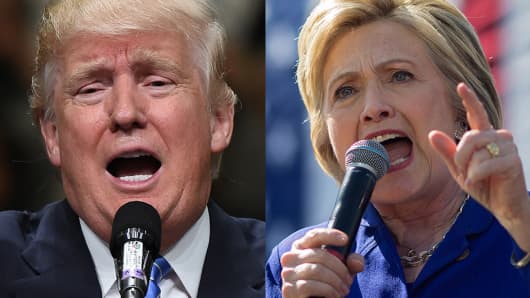Clinton or Trump for president: What that says about America
 Fracture.
Fracture.
There are as many ways to say what this means for America as there are Americans, though most people are baffled and couldn’t answer the question of how the primary season of Election 2016 began and ended as it did.
To recall (it seems so long ago now), that long season started out with a wide field of Republican candidates of different strengths and weaknesses entering primary season many months ago, and wound up with perhaps the least likely one of all as the party nominee. And the Democratic Party’s two candidates were longtime Washington insiders in an anti-establishment climate, though Sen. Bernie Sanders convincingly represented himself as the oustsiders’ candidate.
On the final primary day of 2016, Hillary Clinton prevailed to become the Democratic nominee, and Donald Trump had already arrived as the Republican candidate weeks ago. This is about as unlikely as it gets.
Of all the commentaries and analyses out there to date, one of the most incisive and clarifying accounts comes from Yuval Levin and his new book The Fractured Republic: Renewing America’s Social Contract in the Age of Individualism.
Some highlights from his book, and the conversation I had with him on radio this week…
One of his main themes and central points is that American party politics is stuck in nostalgia for an earlier time when each party believed things were good, or as they should be, and should be again now. For the Democrats, he says, it’s 1965, for Republicans, it’s 1981.
“There’s a sense that everything is breaking down, that America doesn’t work like it used to,” he told me. “The defining theme is that America is not what it used to be. The middle of the 20th Century is the time most people in politics are most nostalgic for now.”
I asked him about his book’s reversal of the perception that we’re in the start of a new phase of American politics, whereas he contends we’re experiencing the end of the last one. “It is the last gasp of an exhausted and nostalgic baby-boomer politics”, he claims.
“So now we have this political situation with two 70 year old candidates yelling at each other over the best way to go backward,” he told me. “And it’s very hard to imagine that as the beginning of the next phase of American politics. In this election we’re seeing the crashing of the baby-boomer centered approach to political life. The question is really what comes next.”
Well put.
Levin continues: “Our problems are distinct to this moment. We would do much better to empower problem solvers throughout the country instead of looking to one leader or a handful. Power has been flowing upward toward Washington. But we have a better chance of addressing problems if we allowed power to flow through communities and institutions. Family, community, church, school, civic institutions.”
Refreshing ideas, and proven to be true from the past, ironically. “The more public policy can be decentralized, the better the hope that it’s going to be more effective, more in line with our Constitution, more in line with what’s going to work better,” he continued. “Most people are persuaded that the way our government works now is not working.The way politics have been handled results in absurdities like the president of the United States deciding who should use which bathrooms in schools.”
Solving problems at the most local level is known, in social teaching, as subsidiarity, and Levin points to that as the ideal. “One thing we do now is embody this idea that the solutions are going to come from our communities,” he said. “Take care of our own problems directly, not wait for someone else. Take, embody and populate institutions that take on problems directly. There’s a great passage in Democracy in America by Alexis de Tocqueville that says ‘When there are problems to be solved, Americans don’t fold their arms and wait for an official to show up, they take it upon themselves’. That’s the spirit we need to have in this election.
Levin says the struggle for religious liberty is central for subsidiarity in this society. “There’s such resistance from the government to allow institutions that embody the moral impulse to take care of things in this country” he said. “This must be fought at the local level.”
However, a convincing pragmatism helps. “It’s important that we who think we have solutions need to make them attractive to political leaders and our fellow voters,” Levin added. “In order to make them politically powerful, you first have to make them attractive to your neighbors. And then your political leaders.”
Start now, if you haven’t already. There may be months left, but they’re going fast. And the year has proven that anything can happen. Even, and especially, the unforeseen.
